
Meta descriptions play a pivotal role in shaping both search engines’ and users’ first impressions of your content.
While they don’t directly influence search rankings, their impact on user engagement, click-through rates (CTR), and overall SEO performance is undeniable.
Think of meta descriptions as your website’s introduction—they’re often the first thing potential visitors see, making it critical to craft them with clarity and persuasion.
Just as you would carefully choose your words when making a first impression at a networking event, the same precision should be applied to writing compelling meta descriptions.
With AI-driven search and semantic analysis evolving rapidly, 2025 presents the perfect opportunity to refine your approach. A well-optimized meta description isn’t just a detail—it’s a strategic advantage that can determine whether users click on your site or scroll to a competitor.
Let’s begin with a core element of on-page SEO.
Metadata consists of brief snippets that provide context about a webpage’s content. It helps search engines interpret a page’s purpose, improving indexing and search result relevance.
Your meta description is one such snippet. While it doesn’t appear on the actual webpage, it often surfaces in search results as a preview of the content.
Although meta descriptions don’t directly impact rankings, they play a crucial role in attracting clicks.
An effective meta description should be concise (around 150-160 characters), informative, and persuasive, clearly conveying what users will find on the page.
It should ignite curiosity and offer a compelling reason to click—boosting CTR and indirectly strengthening SEO performance.
Search engines like Google track user interactions with search results. If your meta description entices more clicks, it signals relevance and engagement, which can contribute to better rankings over time.
With search evolving through AI-driven semantic analysis, meta descriptions must communicate context, not just keywords.
Leveraging structured data (such as schema markup) can further refine how search engines understand your content, linking it to broader topics and increasing visibility—especially for long-tail and voice search queries.
Metadata is a crucial element of SEO, user engagement, and overall site visibility.
While it may seem like a minor detail, well-crafted metadata can have a major impact by:
Now, let’s break down the key strategies for writing compelling meta descriptions.
Keep your meta description within 150-160 characters to avoid truncation in search results.
While Google may sometimes rewrite descriptions based on a user’s query, staying within this range gives you more control over how your page is presented.
A strong meta description directly addresses what users are searching for.
Think about the problem they need to solve and how your content provides the answer—this increases relevance and boosts your chances of earning the click.
Although meta description keywords don’t influence rankings, Google bolds matching terms in search results.
This visual emphasis can make your listing more appealing, so naturally incorporating relevant keywords can help draw attention.
A subtle call to action can make all the difference.
Phrases like “Discover more,” “Learn how,” or “Start today” invite users to engage, increasing click-through rates.
A little intrigue can be a powerful motivator.
Rather than giving everything away, hint at the value your page offers—this technique works especially well for informational searches.
For large websites, like ecommerce platforms, manually crafting unique descriptions for each product isn’t always feasible.
Dynamic meta descriptions that pull key details like product names, categories, and prices can be a smart solution—but they should always remain clear and user-friendly.
While not strictly part of metadata, structured data (schema markup) can enhance your listings by adding context for search engines.
This can lead to rich snippets—such as product reviews, ratings, or recipe cards—making your page stand out in search results.
Meta description optimization is not a one-and-done task.
As search algorithms and user behavior evolve, so should your approach. Regularly analyze performance, refine descriptions, and A/B test different variations to see what resonates most with your audience.
Avoid these common pitfalls to improve SEO and engagement:
As SEO and search technology continue evolving, 2025 marks a pivotal shift in how Google and other search engines handle meta descriptions. These changes will impact how businesses optimize their content for visibility and engagement.
Here’s what to expect:
With AI advancing rapidly, Google’s ability to understand user intent, context, and semantics is sharper than ever.
The days of lexical (keyword-matching) search are over—Google is now fully a semantic search engine.
Google increasingly prioritizes rich search results, meaning structured data is no longer optional—it’s a necessity.
Google isn’t just analyzing what’s written in your meta description—it’s monitoring how users interact with it.
For local businesses, meta descriptions will be increasingly tailored to a user’s location, preferences, and intent.
To stay ahead in 2025, meta description strategies must evolve alongside AI-driven search, user intent, and semantic analysis.
Success will depend on moving beyond keywords to create context-rich, user-centric descriptions that directly align with search intent—enhancing both relevance and the overall search experience.
Struggling with meta descriptions that don’t perform? FoxAdvert ensures your pages stand out with AI-optimized, intent-driven strategies that boost clicks and rankings. Let’s make your SEO work smarter—start today!